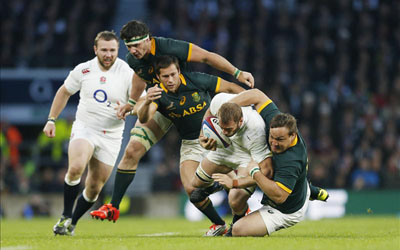Hawk-Eye to Benefit Rugby Like Other Sports, Says Exponential-E’s Barry Daniels
August 18, 2015
World Rugby has announced Hawk-Eye technology will be used at the 2015 Rugby World Cup which gets underway next month.
The technology will help television referees make key decisions at the tournament and will co-exist with the Television Match Official (TMO) system following successful trials.
The system will also have support for medics in the area of identifying and reviewing head impacts.
World Rugby Chief Executive Brett Gosper said: “Technology is an important component of the rugby performance and fan engagement environments and Rugby World Cup 2015 is set to showcase innovation and performance to a record global audience.
“Central to our sport is the integrity of player welfare and the match official decision-making process and we are delighted to be collaborating with Rugby World Cup 2015 host broadcaster ITV and Hawk-Eye to deliver a solution that will enhance these critical areas.
Speaking to iSportconnect about the introduction of Hawk-Eye to the Rugby World Cup 2015, order Barry Daniels, discount Stretegic Alliances at Exponential-e, a leading British provider of ethernet, private cloud and ICT services, believes it will have a positive impact on rugby like it has done with other sports.
“Hawkeye is really the beginning of the adoption of technology I feel within sport at general,” he said.
“You have seen the advantages that it has given to sports like tennis and I feel it will have the same kind of impact on the Rugby World Cup this coming year, but that is just the beginning. The biggest challenge people have is that they feel it will slow down sport, it requires time and therefore you don’t get the proper interaction and it will take away from the spectacle.”
Daniels feels that by using technology in sport, it will minimise mistakes and allow for decisions to be made correctly.
“Take the biggest failure elements of the technology world, 43% of all failures and outages that occur within computer systems are human error. When you put that into the hands of machines that goes down significantly,” he added.
“So technology has a massive part to play in the future of sport.”

